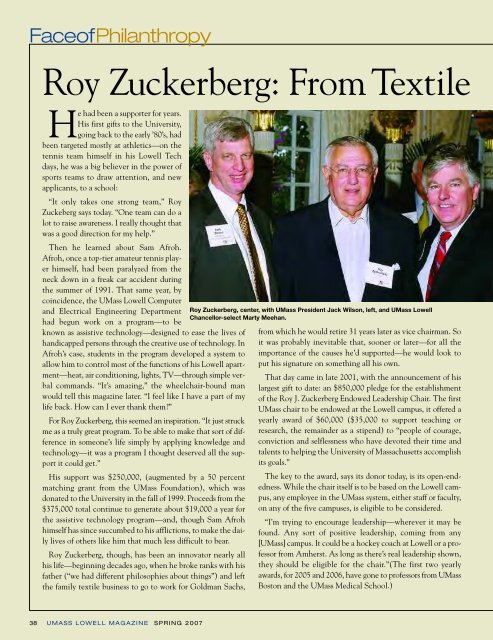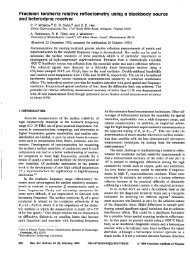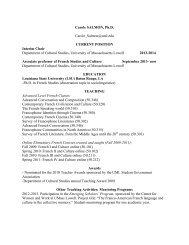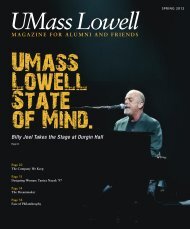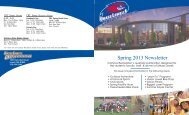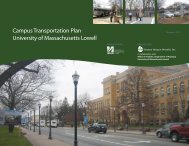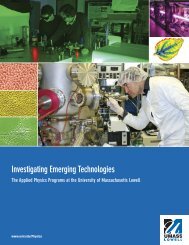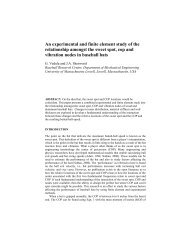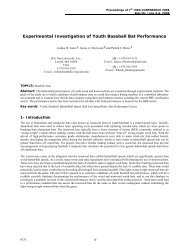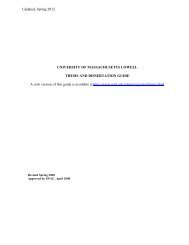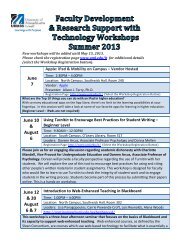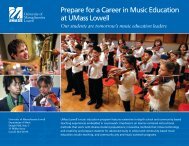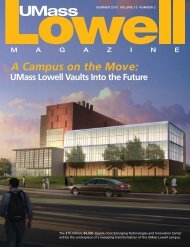Spring 2007 - University of Massachusetts Lowell
Spring 2007 - University of Massachusetts Lowell
Spring 2007 - University of Massachusetts Lowell
You also want an ePaper? Increase the reach of your titles
YUMPU automatically turns print PDFs into web optimized ePapers that Google loves.
Face<strong>of</strong>Philanthropy<br />
Roy Zuckerberg: From Textile<br />
He had been a supporter for years.<br />
His first gifts to the <strong>University</strong>,<br />
going back to the early ’80’s, had<br />
been targeted mostly at athletics—on the<br />
tennis team himself in his <strong>Lowell</strong> Tech<br />
days, he was a big believer in the power <strong>of</strong><br />
sports teams to draw attention, and new<br />
applicants, to a school:<br />
“It only takes one strong team,” Roy<br />
Zuckeberg says today. “One team can do a<br />
lot to raise awareness. I really thought that<br />
was a good direction for my help.”<br />
Then he learned about Sam Afroh.<br />
Afroh, once a top-tier amateur tennis player<br />
himself, had been paralyzed from the<br />
neck down in a freak car accident during<br />
the summer <strong>of</strong> 1991. That same year, by<br />
coincidence, the UMass <strong>Lowell</strong> Computer<br />
and Electrical Engineering Department<br />
had begun work on a program—to be<br />
known as assistive technology—designed to ease the lives <strong>of</strong><br />
handicapped persons through the creative use <strong>of</strong> technology. In<br />
Afroh’s case, students in the program developed a system to<br />
allow him to control most <strong>of</strong> the functions <strong>of</strong> his <strong>Lowell</strong> apartment—heat,<br />
air conditioning, lights, TV—through simple verbal<br />
commands. “It’s amazing,” the wheelchair-bound man<br />
would tell this magazine later. “I feel like I have a part <strong>of</strong> my<br />
life back. How can I ever thank them?”<br />
For Roy Zuckerberg, this seemed an inspiration. “It just struck<br />
me as a truly great program. To be able to make that sort <strong>of</strong> difference<br />
in someone’s life simply by applying knowledge and<br />
technology—it was a program I thought deserved all the support<br />
it could get.”<br />
His support was $250,000, (augmented by a 50 percent<br />
matching grant from the UMass Foundation), which was<br />
donated to the <strong>University</strong> in the fall <strong>of</strong> 1999. Proceeds from the<br />
$375,000 total continue to generate about $19,000 a year for<br />
the assistive technology program—and, though Sam Afroh<br />
himself has since succumbed to his afflictions, to make the daily<br />
lives <strong>of</strong> others like him that much less difficult to bear.<br />
Roy Zuckerberg, though, has been an innovator nearly all<br />
his life—beginning decades ago, when he broke ranks with his<br />
father (“we had different philosophies about things”) and left<br />
the family textile business to go to work for Goldman Sachs,<br />
Roy Zuckerberg, center, with UMass President Jack Wilson, left, and UMass <strong>Lowell</strong><br />
Chancellor-select Marty Meehan.<br />
from which he would retire 31 years later as vice chairman. So<br />
it was probably inevitable that, sooner or later—for all the<br />
importance <strong>of</strong> the causes he’d supported—he would look to<br />
put his signature on something all his own.<br />
That day came in late 2001, with the announcement <strong>of</strong> his<br />
largest gift to date: an $850,000 pledge for the establishment<br />
<strong>of</strong> the Roy J. Zuckerberg Endowed Leadership Chair. The first<br />
UMass chair to be endowed at the <strong>Lowell</strong> campus, it <strong>of</strong>fered a<br />
yearly award <strong>of</strong> $60,000 ($35,000 to support teaching or<br />
research, the remainder as a stipend) to “people <strong>of</strong> courage,<br />
conviction and selflessness who have devoted their time and<br />
talents to helping the <strong>University</strong> <strong>of</strong> <strong>Massachusetts</strong> accomplish<br />
its goals.”<br />
The key to the award, says its donor today, is its open-endedness.<br />
While the chair itself is to be based on the <strong>Lowell</strong> campus,<br />
any employee in the UMass system, either staff or faculty,<br />
on any <strong>of</strong> the five campuses, is eligible to be considered.<br />
“I’m trying to encourage leadership—wherever it may be<br />
found. Any sort <strong>of</strong> positive leadership, coming from any<br />
[UMass] campus. It could be a hockey coach at <strong>Lowell</strong> or a pr<strong>of</strong>essor<br />
from Amherst. As long as there’s real leadership shown,<br />
they should be eligible for the chair.”(The first two yearly<br />
awards, for 2005 and 2006, have gone to pr<strong>of</strong>essors from UMass<br />
Boston and the UMass Medical School.)<br />
38 UMASS LOWELL MAGAZINE SPRING <strong>2007</strong>


